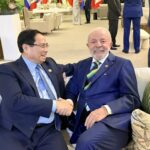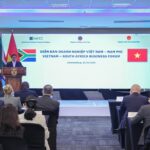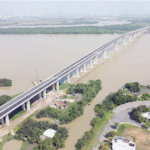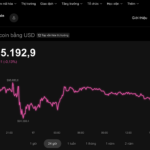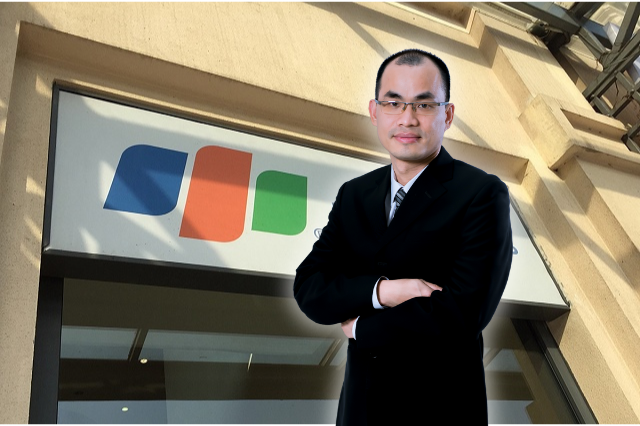The recent awarding of the prestigious Order of Friendship by Russian President Vladimir Putin to Thai Huong, a Vietnamese entrepreneur and Labor Hero, marks a significant milestone in the burgeoning relationship between Vietnam and Russia, particularly in economic and trade sectors. As we approach 2025, the 75th anniversary of diplomatic relations between Vietnam and the Russian Federation, both nations celebrate remarkable achievements in key areas such as railways, nuclear energy, oil and gas, and agriculture. Notably, increased investments from Russian enterprises in Vietnam and vice versa are significantly strengthening the trusted partnership between the two countries.
On this occasion, we had the privilege of speaking with H.E. Bezdetko Gennady Stepanovich, Ambassador Extraordinary and Plenipotentiary of the Russian Federation to Vietnam, about the prospects of cooperation and the shared vision for a prosperous future between Vietnam and Russia.
“VIETNAM CAN BECOME A KEY LOGISTICS HUB FOR RUSSIA”
2025 has seen substantial advancements in Vietnam-Russia bilateral cooperation, highlighted by the construction of a 2,200 km transcontinental railway and other significant economic and trade agreements. How do you assess the significance and prospects of this partnership?
Ambassador G.S. Bezdetko: Diplomatic relations between Russia and Vietnam, established in January 1950, have traversed a glorious path. Today, our relationship continues to thrive, grounded in sincere friendship and mutually beneficial cooperation across various sectors, including politics, security, culture, and tourism. We are delighted to witness a significant increase in collaborative activities, aligning with the fundamental interests of our peoples.
A critical factor in enhancing cooperation across multiple sectors is the improvement of transportation connectivity. Currently, both sides are discussing the development of a railway transport corridor linking Vietnam to Russia via China and Mongolia. This new logistics route holds immense potential, serving as a key driver for strengthening trade and economic relations between our nations. Equally important is the effective utilization of the Free Trade Agreement between the Eurasian Economic Union (EAEU) and Vietnam, signed in 2015.
Speaking of connectivity, I must highlight the aviation sector. In 2024 and 2025, thanks to the efforts of relevant ministries and agencies, regular and charter flights between Russia and Vietnam have been restored. Numerous direct routes now connect Moscow, St. Petersburg, Irkutsk, Kazan, Khabarovsk, and Vladivostok to Hanoi, Ho Chi Minh City, and Nha Trang. This has significantly boosted Russian tourist arrivals in Vietnam. According to statistics, from January to October 2025, the number of Russian tourists increased nearly threefold, reaching approximately 0.5 million visitors.
Another exemplary case is maritime transport. FESCO, a leading Russian transport company, has operated in Vietnam for over 20 years. Since 2022, the company has been transporting goods from Russian ports in Vladivostok, Novorossiysk, and St. Petersburg to Vietnam. We anticipate continued support from Vietnam for Russian transport enterprises operating in the country.
Another critical area of cooperation is the accelerated negotiations and preparations for the Ninh Thuan Nuclear Power Plant. Could you provide more details on this?
Ambassador G.S. Bezdetko: Indeed, nuclear energy for peaceful purposes is another promising area of cooperation. Approximately 15 years ago, Russia and Vietnam collaborated on the Ninh Thuan 1 Nuclear Power Plant project, Vietnam’s first nuclear power plant. However, due to objective reasons, the project was suspended in 2016. It has now been reactivated.
We plan to sign an intergovernmental agreement on the construction of the nuclear power plant in Vietnam by the end of this year, committing to the use of advanced technologies and strict adherence to safety standards. Relevant authorities from both countries are actively engaged in finalizing the design documentation. This large-scale project will elevate our cooperation in innovation and high technology to new heights.
Additionally, under the Roadmap for Cooperation until 2030, signed by Rosatom Director General A.E. Likhachev and Vietnamese Minister of Science and Technology Nguyen Manh Hung in May, both parties are working towards establishing a Nuclear Science and Technology Center. This center is expected to be located in Dong Nai Province, Southern Vietnam, featuring the most modern research reactor in the region.
To support future nuclear projects, hundreds of Vietnamese experts have been trained in Russia and will form a highly skilled workforce. I am confident that in the near future, they will make significant contributions to Vietnam’s nuclear industry and fundamental science development.
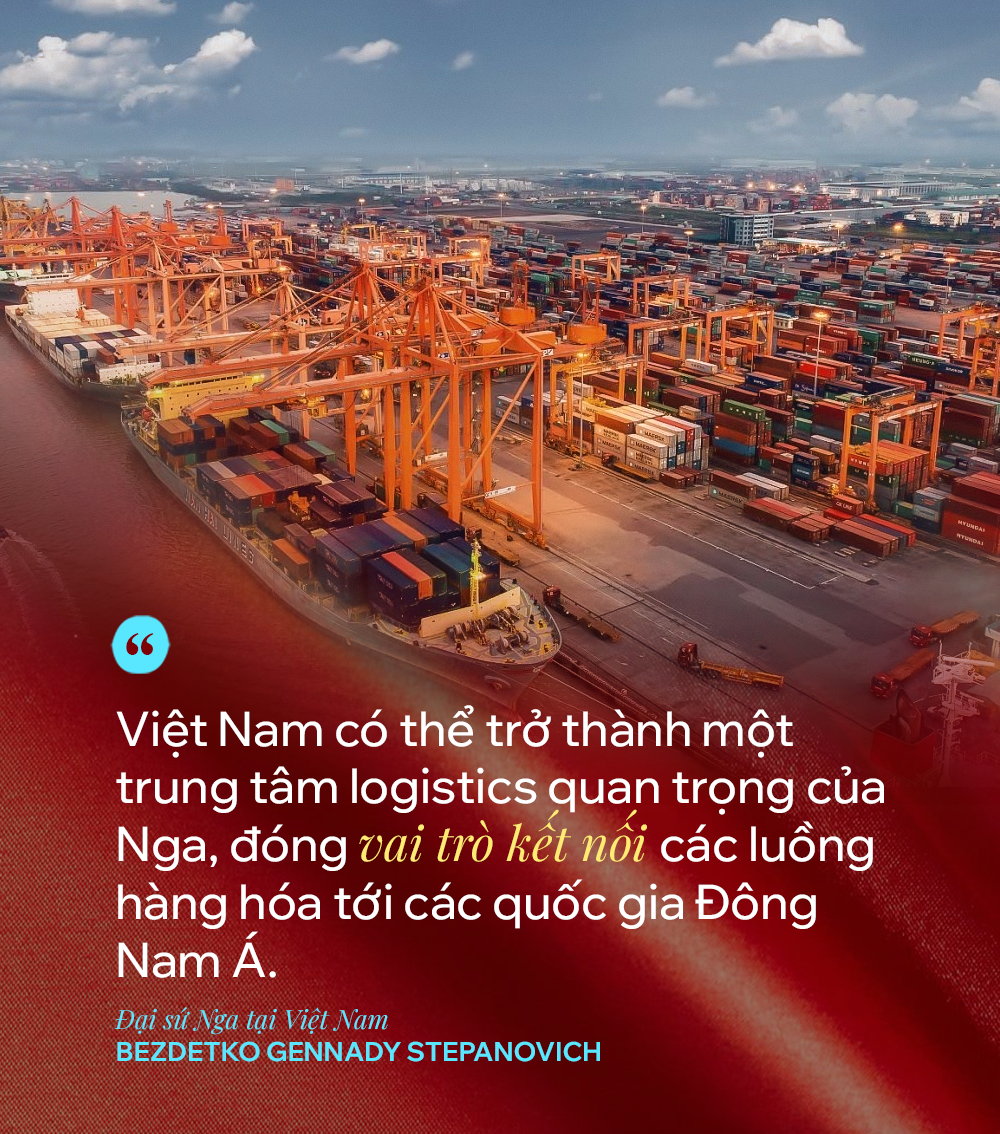
What specific benefits do you foresee for both countries from this cooperation?
Ambassador G.S. Bezdetko: Transportation and peaceful nuclear energy are the most promising areas of cooperation. Vietnam can become a key logistics hub for Russia, connecting cargo flows to Southeast Asian countries. Russian companies are actively engaged in maritime transport to Vietnam, employing modern digital solutions to streamline cargo handling and optimize routes.
As mentioned, Russia is keen on expanding cooperation in nuclear energy and nuclear medicine. This collaboration will form the foundation for mutually beneficial interaction for decades to come.
Overall, Vietnam has been, is, and will remain one of Russia’s most important strategic partners in the region. Strengthening and developing our bilateral relations fully aligns with the national interests and aspirations of our peoples.
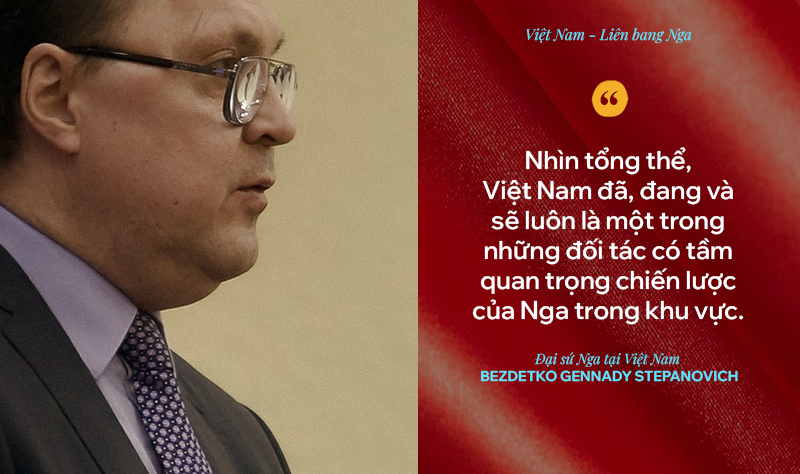
“TH’S PROJECTS IN RUSSIA DEEPEN THE SUBSTANTIVE COOPERATION BETWEEN OUR NATIONS”
Alongside infrastructure and energy, agriculture is a rapidly growing sector in Vietnam. Recently, President Vladimir Putin awarded the Order of Friendship to Thai Huong, Founder and Chairwoman of the Strategic Council of TH Group. What is your assessment of the agricultural cooperation prospects between our countries?
Ambassador G.S. Bezdetko: Indeed, on National Unity Day, November 4th, President Vladimir Putin awarded state honors to intellectuals, creatives, and entrepreneurs from various countries. We are particularly pleased that among them was Thai Huong, the head of Vietnam’s largest private dairy company, TH Group.
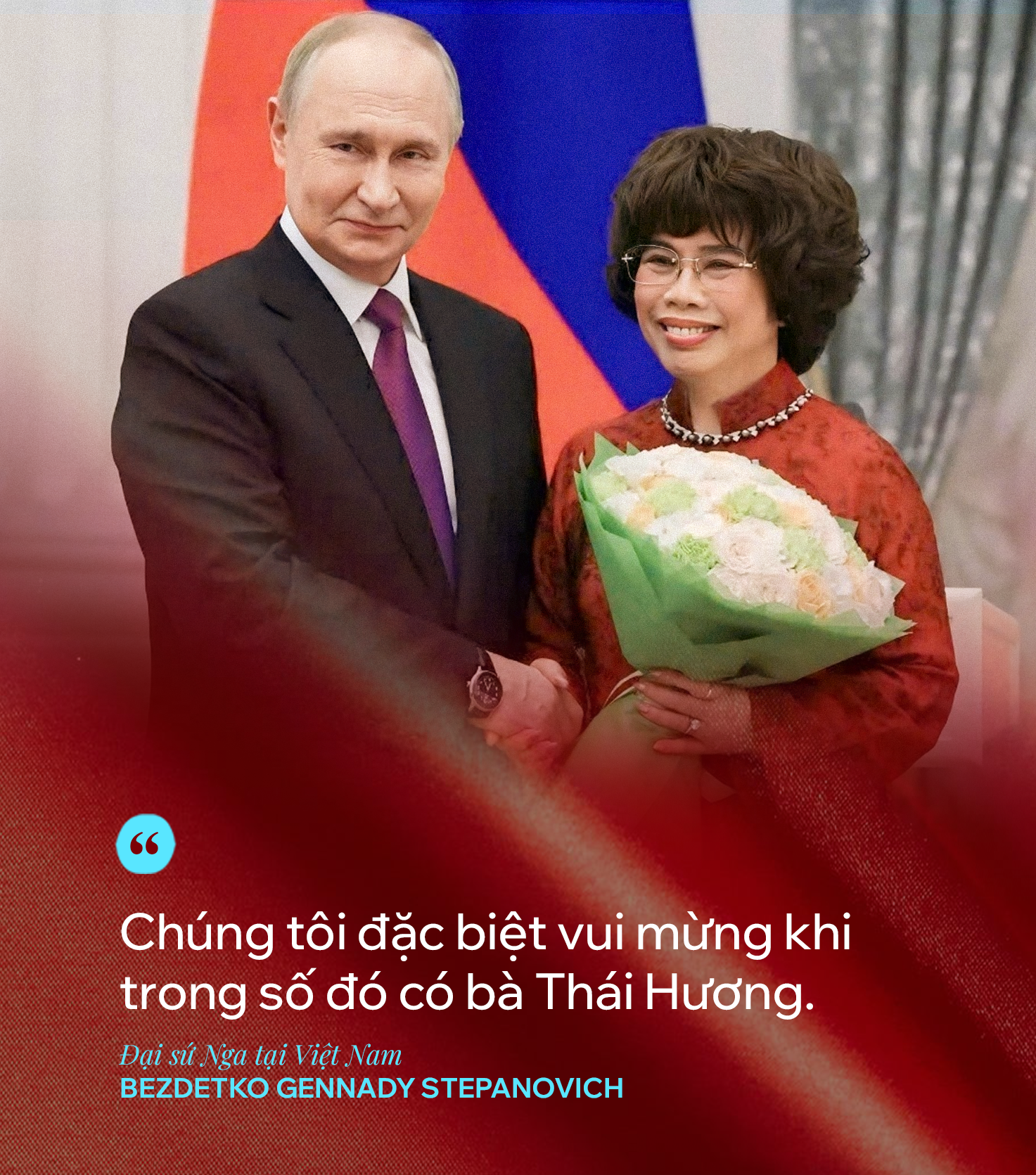
Currently, TH Group is successfully implementing investment projects to build livestock complexes and dairy processing plants in Moscow and Kaluga regions. These projects not only contribute to Russia’s food security but also deepen the substantive cooperation between our nations.
We are pleased to note that in 2025, Russia-Vietnam agricultural cooperation continued to develop steadily, thanks to the active efforts of relevant ministries, agencies, and the business community, as well as the implementation of new joint initiatives.
Russian companies are increasingly recognizing the vast potential and rapid growth of Vietnam’s agricultural sector. Regular contacts between economic operators from both countries are systematically conducted through industry-level meetings, business delegations, and individual working visits aimed at establishing direct relations, conducting negotiations, and exploring market opportunities.
A key component of bilateral cooperation is the export of Russian agricultural products to Vietnam. This year, Russia has solidified its position as a leading supplier of meat and meat products to Vietnam. Specifically, Russia accounts for approximately 50% of Vietnam’s frozen pork imports, highlighting the competitiveness of Russian products and stable demand from Vietnamese consumers.
Cooperation in the seafood trade and aquaculture technology exchange is expanding robustly. Expert delegations from both countries regularly visit each other’s production facilities, research centers, and processing plants. This has opened up new avenues for collaboration, including the application of Russian technology in sturgeon and salmon farming adapted to Vietnam’s climate conditions.
A significant factor driving Russian agricultural products into the Vietnamese market is the active participation of Russian companies in international and domestic exhibitions in Vietnam. These events facilitate business meetings, technology showcases, product displays, and direct negotiations, collectively contributing to expanded trade and new contract signings.
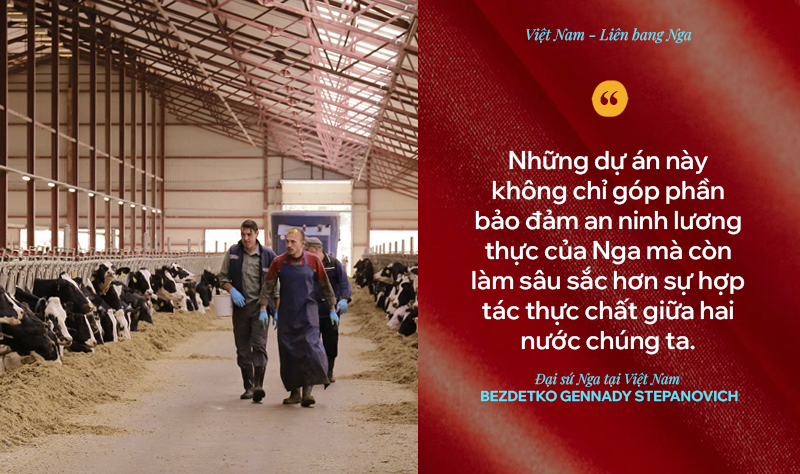
In 2025, a strategic project between Russian and Vietnamese retail business leaders has gained momentum. Thanks to this initiative, the range of value-added Russian products on Vietnamese supermarket shelves has significantly expanded, including processed fish and meat, vegetable oils, confectionery, beverages, and baby food. This initiative clearly holds immense potential.
Given the long-standing tradition of cooperation between our countries, what key factors underpin the current successful relationship between Vietnam and Russia?
Ambassador G.S. Bezdetko: The foundation of Russia-Vietnam relations lies in regular and trustworthy political dialogue, rooted in a strong tradition of friendship and diverse cooperation unaffected by external fluctuations.
Historical context is also crucial: nearly 80 years ago, the Soviet Union was among the first nations to recognize the young Vietnamese state. Our peoples stood together during Vietnam’s struggle for freedom and independence against foreign invasion and in post-war peacebuilding. Our relationship has withstood the test of time and maintains its positive momentum today.
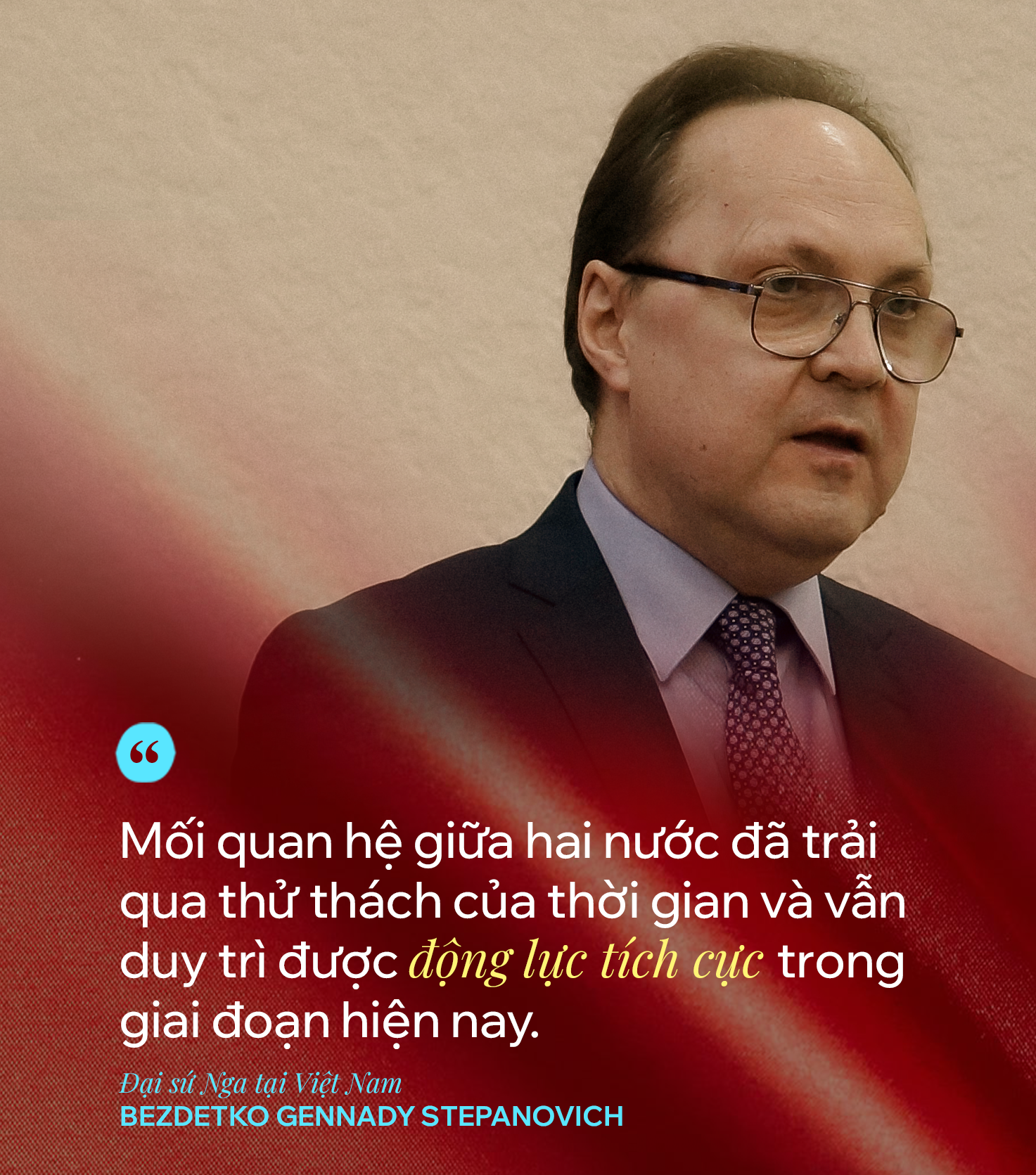
Another critical factor is the alignment or closeness of our approaches to international issues, such as respect for international law norms and the principles of the UN Charter, aimed at achieving mutually beneficial and equitable cooperation, rejecting political imposition. This ensures the reliability of high-level political dialogue and constructive interaction in the spirit of a comprehensive strategic partnership.
Thank you very much, Your Excellency!
Prime Minister Meets G20 Leaders: Advancing Economic, Trade, and Agricultural Cooperation
On the sidelines of the G20 Summit in South Africa, Prime Minister Pham Minh Chinh held a series of meetings with leaders of various countries and international organizations. These engagements aimed to foster economic, trade, and agricultural cooperation, while also mobilizing resources for development in the new phase.
Unlocking the Future: 8 Mega Bridge & Road Projects Pave the Way for a 20 Million-Strong Super Metropolitan Region
These transformative projects will catalyze regional infrastructure development, driving unprecedented growth and connectivity.

